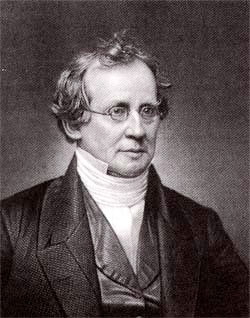Charles Hodge (1797 – 1878) was a tremendously important Presbyterian theologian. He was the principal of Princeton Theological Seminary for over 25 years and in many ways laid the foundation for the Fundamentalist and Evangelical movements of the next century. During the Old School-New School split in the Presbyterian church in the early nineteenth century, Hodge sided firmly with the traditionalist Old School. Besides being the principal at Princeton Theological Seminary, Hodge also wrote extensively, including his own three-volume set of systematic theology, conveniently entitled Systematic Theology. In his books, Hodge touches on race, racial identity for the Christian, and national characteristics.
It is admitted that nations as well as tribes and families, have their distinctive characteristics, and that these characteristics are not only physical and mental, but also social and moral. Some tribes are treacherous and cruel. Some are mild and confiding. Some are addicted to gain, others to war. Some are sensual, some intellectual. We instinctively judge of each according to its character. . . . [A]dmitting that these dispositions are innate and hereditary, and that they are not self-acquired by the individual whose character they constitute, we nevertheless, and none the less, approve or condemn them according to their nature. This is the instinctive and necessary, and therefore the correct, judgment of the mind.
Systematic Theology, Volume 2, Chapter 5, Section 6
Paul had two classes of brethren; those who were with him the children of God in Christ; these he calls brethren in the Lord, Philip, i. 14, holy brethren, &c. The others were those who belonged to the family of Abraham. These he calls brethren after the flesh, that is, in virtue of natural descent from the same parent. Philemon he addresses as his brother, both in the flesh and in the Lord. The Bible recognizes the validity and rightness of all the constitutional principles and impulses of our nature. It therefore approves of parental and filial affection, and, as is plain from this and other passages, of peculiar love for the people of our own race and country.
Commentary on Romans 9
[The] differences between the Caucasian, Mongolian, and negro races, which is known to have been as distinctly marked two or three thousand years before Christ as it is now. . . . [T]hese varieties of race are not the effect of the blind operation of physical causes, but by those cause as intelligently guided by God for the accomplishment of some wise purpose. . . . God fashions the different races of men in their peculiarities to suit them to the regions which they inhabit.Systematic Theology, Volume 2, Chapter 1, Section 3
But Alienists will continue to swear up and down that Kinism is a brand new invention not related to historical Christianity.
| Tweet |
|
|
|





